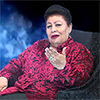
Ustad Farida Mahwash (Farida Gulali Ayubi) was born into a conservative Afghan family. Her mother was a Quran teacher, who recited with a beautiful voice, an early inspiration to the young girl. But religion loomed large in the family, and formany years, her interest in music was suppressed. Upon completing her studies,Farida was recruited to sing for Kabul Radio. The station's director, UstadKhayal, encouraged her to pursue singing as a career. It was Ustad Khayal who gave Farida her enduring stage name, Mahwash, which means "like the moon."Mahwash's robust and mellifluous voice, and her command of the subtle art of ornamentation, has gone on to dazzle audiences worldwide, as she shares her country's rich musical heritage through performances and recordings.
Mahwash then took music and singing lessons under the tutelage of Ustad Mohammad Hashim Chishti. An established maestro, Chishti quickly launched his protégé on a rigorous training regime. Most of his lessons, which are based on North Indian classical music,are still used today to train Afghan singers. Mahwash went on to study with the renowned Afghan singer Ustad Hussain Khan Sarahang, who guided her through hermeteoric rise as a radio star. Another master composer, Ustad Shahwali, created many songs for her to sing on the radio. One of the best known was "O Bacha (Oh Boy)," which brings together half a dozen regional songs in one extended modern song cycle. When Mahwash learned this complex piece and recorded it in a single day, she was given the title of Ustad—or "master" in 1977—a controversial move as, until that point, this was an honour reserved only for men. After the political turmoil of late 1970s and '80s, Ustad Mahwash was forced to leave Afghanistan.
In 1991, she and her family moved to Pakistan, where she took refuge from two warring factions, each of whom wanted her to sing for their cause, or face assassination. Worn and exhausted, she applied for asylum abroad, and, eventually, her plight was recognised by the United Nations High Commissioner for Refugees (UNHCR). Mahwash was granted political asylum in the United States in October 1991
In 2012 Mahwash became a member of the group Voices of Afghanistan, an Afghani ensemble featuring Mahwash on vocals, rubab master Homayoun Sakhi, and The Sakhi Ensemble. Also were other notable Afghan master/ and Uzbekistan (Abbos Kosimov) musicians and singers. This collaboration debuted in June 2012 under the direction of music producer and composer Dawn Elder, who created this group with Mawash and Homayoun.
One of their landmark performances came before 27,000 American fans at the Carrier Dome for the One World Concert event. In 2012, Mahwash, Homayoun Sakhi and the group began recording a new album with world music producer Dawn Elder and Sam Nappi at World Harmony Studios. After a year in the making they are now preparing the release. In this recording Ustad Mahwash, Homayoun Sakhi and the group are joined by a host of notable celebrity musicians and singers including Grammy winning singer Angelique Kidjo. The album is set to release on World Harmony Studios/D E Music Records is entitled "Love Songs for Humanity". The official release is on 3 September 2013 on line and in stores on 27 September 2013.
Ustad Mahwash's Albums

